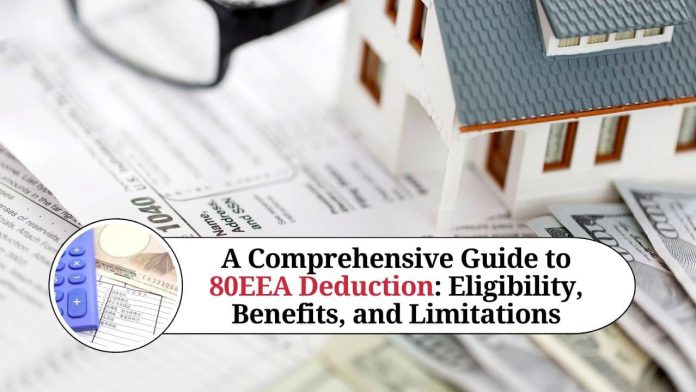With the skyrocketing prices of real estate in India, buying a house has become a distant dream for many individuals. To promote affordable housing and make it easier for individuals to buy their own house, the government of India introduced various tax benefits and deductions for homebuyers. One such tax benefit is the 80EEA deduction, which was introduced in the Union Budget of 2019. In this article, we will discuss the 80EEA deduction in detail, including its eligibility criteria, benefits, and limitations.
What is 80EEA Deduction?
Section 80EEA of the Income Tax Act provides an additional tax deduction of up to Rs. 1.5 lakh for interest paid on a home loan. This deduction is over and above the existing tax benefits provided under Section 24(b) and Section 80C of the Income Tax Act. This deduction is available to first-time homebuyers and can be claimed only once during the entire loan tenure.
Eligibility Criteria:
To be eligible for the 80EEA deduction, an individual must meet the following conditions:
The individual must be a first-time homebuyer, i.e., he/she should not own any other residential property on the date of sanction of the home loan.
The individual must have taken a home loan from a financial institution between 1st April 2019 and 31st March 2021.
The stamp duty value of the house should not exceed Rs. 45 lakhs.
The loan amount should not exceed Rs. 35 lakhs.
Benefits of 80EEA Deduction:
Additional Tax Benefit: The 80EEA deduction provides an additional tax benefit of up to Rs. 1.5 lakhs over and above the existing tax benefits provided under Section 24(b) and Section 80C of the Income Tax Act.
Affordable Housing: The 80EEA deduction aims to promote affordable housing by encouraging first-time homebuyers to invest in residential properties.
Reduced Tax Liability: The 80EEA deduction can help reduce the tax liability of the individual by reducing the taxable income.
Limitations of 80EEA Deduction:
Limited Time Period: The 80EEA deduction is available only for home loans taken between 1st April 2019 and 31st March 2021. Therefore, individuals who have taken home loans before or after this time period are not eligible for this deduction.
Limited to First-time Homebuyers: The 80EEA deduction is available only to first-time homebuyers. Therefore, individuals who already own a residential property are not eligible for this deduction.
Limited Loan and Property Value: The 80EEA deduction is available only for home loans up to Rs. 35 lakhs and for properties with a stamp duty value of up to Rs. 45 lakhs.
How to Claim 80EEA Deduction?
To claim the 80EEA deduction, an individual needs to follow these steps:
Check Eligibility: The individual needs to ensure that he/she meets all the eligibility criteria for the 80EEA deduction.
Collect Relevant Documents: The individual needs to collect all the relevant documents, such as the home loan agreement, loan statement, and certificate from the financial institution stating the interest paid on the home loan.
File Income Tax Return: The individual needs to file his/her income tax return and claim the deduction under Section 80EEA.
In conclusion
the 80EEA deduction provides an additional tax benefit for first-time homebuyers, encouraging them to invest in affordable housing. The eligibility criteria, benefits, and limitations of this deduction should be carefully understood before claiming it. While this deduction is a temporary measure and is available only for a limited time period, it has certainly made home buying more accessible to many individuals in India. Therefore, if you are a first-time homebuyer and meet the eligibility criteria, you should consider taking advantage of the 80EEA deduction to reduce your tax liability and make your dream of owning a house a reality.
Frequently Asked Question
Q. What is 80EEA deduction?
80EEA deduction is a tax deduction offered by the Indian government for homebuyers to encourage the purchase of affordable housing. Under this deduction, a taxpayer can claim an additional deduction of up to Rs. 1.5 lakh on interest paid on a home loan taken for the purchase of a residential property.
Q. Who is eligible for 80EEA deduction?
To be eligible for 80EEA deduction, a taxpayer must fulfill the following criteria:
- The taxpayer must be a first-time homebuyer.
- The home loan must be taken between 1st April 2019 and 31st March 2022.
- The stamp duty value of the property should not exceed Rs. 45 lakh.
- The taxpayer must not own any other residential property on the date of sanction of the home loan.
Q. What is the maximum deduction amount under 80EEA?
The maximum deduction amount that can be claimed under 80EEA is Rs. 1.5 lakh. This deduction is in addition to the deductions available under Section 24(b) of the Income Tax Act.
Q. What types of loans are eligible for 80EEA deduction?
Only home loans taken for the purpose of purchasing an affordable housing property are eligible for 80EEA deduction. Loans taken for other purposes such as renovation, repairs, or extension of the property are not eligible.
Q. Is there any limit on the property value for claiming 80EEA deduction?
Yes, the stamp duty value of the property should not exceed Rs. 45 lakh to be eligible for 80EEA deduction.
Q. Can a taxpayer claim both 80EEA and 24(b) deductions on the same loan?
Yes, a taxpayer can claim both 80EEA and 24(b) deductions on the same loan. Under Section 24(b), a taxpayer can claim a deduction of up to Rs. 2 lakh on the interest paid on a home loan.
Q. Is 80EEA deduction available for commercial properties?
No, 80EEA deduction is only available for residential properties.
Q. What documents are required to claim 80EEA deduction?
The following documents are required to claim 80EEA deduction:
- Home loan agreement
- Certificate of possession from the builder/developer
- Certificate from the lending institution stating the amount of interest paid during the financial year.




















